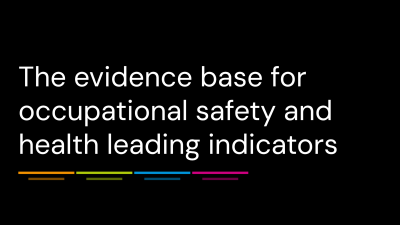
The evidence base for occupational safety and health leading indicators
Establishing what is known about how leading indicators improve safety.
Discover how Lloyd's Register Foundation is generating, collating and sharing the best evidence and insight on what works to improve safety.
Countries are included in the latest World Risk Poll.

Across the world and across different sectors, there is a huge opportunity to improve safety outcomes by generating better quality evidence on both the scale and nature of the challenges, and on what works to address them. But simply generating that evidence is not enough – it must also be relevant, understandable, accessible and actionable by those in a position to put it into practice.
That’s why, underpinning all our other areas of work – be it in the maritime sector, on critical infrastructure, or in occupational safety and health more broadly – Lloyd’s Register Foundation has always had a commitment to generating, collating and sharing more robust evidence to better understand the complex factors that affect safety.
Taking this commitment one step further, the Foundation is working towards the establishment of a Global Safety Evidence Centre, which will serve as a ‘one-stop-shop’ for anyone who needs to know ‘what works’ to make people safer – collating the best evidence from our partners and other sources, as well as providing a home for the Foundation’s own evidence outputs, such as our flagship World Risk Poll.
Explore our work in this area below.
Live evidence and insight grants.
Countries receiving funding in this area.
Current value of grant portfolio in this area.
Nancy Hey Director of Evidence and Insight
Across all areas of the Foundation's work, generating, collating and sharing the best evidence on what works to improve safety is at the heart of what we do.
This page was published on
This page is approximately a 4 minute read
Part of the role of the Global Safety Evidence Centre is to develop methods to ensure the work we fund to is evidence-based and impactful. That starts with getting the grant application and review process right, and so we commissioned Mission Economics to develop a framework.
This page was published on
This page is approximately a 5 minute read
With over 40 years of experience in managing safety within high-hazard industries, Martin Cottam offers invaluable leadership as Chair of the Expert Advisory Panel for the new Lloyd’s Register Foundation Global Safety Evidence Centre.
This page was published on
This page is approximately a 5 minute read
In this blog, Giulia Maistrello, Senior Analyst at RAND Europe introduces the findings from two new reports. These reports underpin the Global Safety Evidence Centre’s new evidence programme on safe work, exploring both the evidence needs of safety practitioners and the evidence currently available to support them.
This page was published on
This page is approximately a 4 minute read
Joaquim Pintado Nunes - the International Labour Organisation Branch Chief responsible for occupational safety and health and the working environment - discusses why the Global Safety Evidence Centre is needed.
The Lloyd’s Register Foundation World Risk Poll is the first and only global study of worry about, and harm from, risks to people’s safety.
Visit the site




